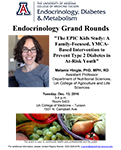 Battling childhood obesity and early onset Type 2 diabetes one bite at a time is the theme of the next Endocrinology Grand Rounds lecture Dec. 13 with speaker Melanie Hingle, PhD, MPH, RD, a registered dietitian and assistant professor in the Department of Nutritional Sciences at the UA College of Agriculture and Life Sciences (CALS).
Battling childhood obesity and early onset Type 2 diabetes one bite at a time is the theme of the next Endocrinology Grand Rounds lecture Dec. 13 with speaker Melanie Hingle, PhD, MPH, RD, a registered dietitian and assistant professor in the Department of Nutritional Sciences at the UA College of Agriculture and Life Sciences (CALS).
The lecture series was renewed in September 2016 by the University of Arizona Division of Endocrinology, Diabetes & Metabolism. The talks are open to the public, community physicians as well as other health-care professionals interested in learning more on these subjects.
Dr. Hingle will speak on:
 "The EPIC Kids Study: A Family-Focused, YMCA-Based Intervention to Prevent Type 2 Diabetes in At-Risk Youth"
"The EPIC Kids Study: A Family-Focused, YMCA-Based Intervention to Prevent Type 2 Diabetes in At-Risk Youth"
Tuesday, Dec. 13, 3-4 p.m.
Room 5403, UA College of Medicine – Tucson
1501 N. Campbell Ave.
Please ![]() click here [PDF] (or the image at left) to view and share the flyer for this event.
click here [PDF] (or the image at left) to view and share the flyer for this event.
 Dr. Hingle is most interested in development of unique, innovative programs and tools to effectively change behavior to mitigate unhealthy weight gain and promote optimal health. The EPIC Kids Study is one aspect of that. Among some of the tools incorporated are fun videos to teach youth and others how to eat better and that eating better is easier than they might think. Videos are just one element of that, including these two:
Dr. Hingle is most interested in development of unique, innovative programs and tools to effectively change behavior to mitigate unhealthy weight gain and promote optimal health. The EPIC Kids Study is one aspect of that. Among some of the tools incorporated are fun videos to teach youth and others how to eat better and that eating better is easier than they might think. Videos are just one element of that, including these two:
- “Healthy, Easy Snack Ideas for Kids” [video]
- “Getting Your Kids to Eat Healthy and Be a Nutrition Role Model” [video]
Dr. Hingle—who is affiliated with the UA Center for Food Studies, Canyon Ranch Center for Prevention and Health Promotion, and UA Cancer Center—earned her bachelor’s degree in nutritional sciences and dietetics from the UA, then completed a dietetic internship at the University of California – San Francisco Medical Center before earning a master’s in public health degree in epidemiology from the UA Mel and Enid Zuckerman College of Public Health and a doctorate in nutritional sciences from CALS. She also completed a postdoctoral fellowship in behavioral nutrition at the USDA-ARS Children’s Nutrition Research Center at the Baylor College of Medicine in Houston.
 She notes in her research that it’s estimated one in every six overweight youth has “prediabetes,” placing them at higher risk for early onset Type 2 diabetes and related illness (click on image at right to enlarge). Diabetes risk can be significantly reduced through modifications to energy balance behaviors (better diet, physical activity, sedentary behavior and sleep) to help maintain a healthy weight trajectory and prevent excess weight gain, while allowing for normal growth, development, and maturation.
She notes in her research that it’s estimated one in every six overweight youth has “prediabetes,” placing them at higher risk for early onset Type 2 diabetes and related illness (click on image at right to enlarge). Diabetes risk can be significantly reduced through modifications to energy balance behaviors (better diet, physical activity, sedentary behavior and sleep) to help maintain a healthy weight trajectory and prevent excess weight gain, while allowing for normal growth, development, and maturation.
“In the Behavioral Nutrition Laboratory, we seek to identify childhood ‘diabesity’ prevention strategies and approaches that are feasible, acceptable (i.e., fun, relevant, and useful) and effective and disseminate these programs through community locations and organizations that are safe, accessible, and affordable to all,” Dr. Hingle said.
Her current research areas include:
- Determinants of metabolic risk, and amelioration of risk, in pediatric cancer survivors
- Guided imagery intervention delivered via a mobile software application to increase healthy eating and physical activity in weight-concerned women smokers
- Family-focused diabetes prevention program delivered in partnership with the YMCA
For her latest bibliography, click here.
The Endocrinology Grand Rounds take place on the second Tuesdays of the month at the same time and location as listed above. For more information, please contact Regina Warren, (520) 626-6376 or rwarren@deptofmed.arizona.edu

